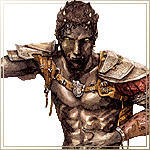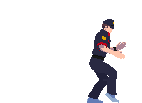"CUSTOMER IS ALWAYS RIGHT" - TAKING FEEDBACK
Posts
There's a saying in sales that goes "The customer is always right", which basically means that in sales your goal is to get money by selling, and the customer is the one paying, so whatever makes him pay is the right thing to do (or something like that).
Although we can make a direct comparison to commercial games (in which case players ARE customers), let's talk about indie games. What can we say about the idea that "The player is always right"? when dealing with feedback?
For instance, you're making a game where you want, for some reason, a certain area to be difficult and somewhat frustrating... you achieve that, but all players complain that they didn't like that area because it was frustrating. I mean, ALL OF YOUR PLAYERS DON'T LIKE THAT PART. Do you necessarily have to change that? If not, why not?
A more concrete example, speaking for myself... I deliberately slowed down the movement speed in Dungeoneer for mood purposes, but almost everyone hated it. My players hated that part of my game. Does that mean I should change it? Why/why not?
Question is: when should the game maker give in to players' demands, and when should he stick to his original ideas DESPITE the players' demands?
Although we can make a direct comparison to commercial games (in which case players ARE customers), let's talk about indie games. What can we say about the idea that "The player is always right"? when dealing with feedback?
For instance, you're making a game where you want, for some reason, a certain area to be difficult and somewhat frustrating... you achieve that, but all players complain that they didn't like that area because it was frustrating. I mean, ALL OF YOUR PLAYERS DON'T LIKE THAT PART. Do you necessarily have to change that? If not, why not?
A more concrete example, speaking for myself... I deliberately slowed down the movement speed in Dungeoneer for mood purposes, but almost everyone hated it. My players hated that part of my game. Does that mean I should change it? Why/why not?
Question is: when should the game maker give in to players' demands, and when should he stick to his original ideas DESPITE the players' demands?
Crucial difference is that the customer paid you. (And as the purveyor of a creative service for which I am actually paid, I do not even listen to all of my actual CUSTOMERS' feedback as in fact the old saying is just emphatically wrong.)
It is not literally true that 'the customer is always right'. What it MEANS is that 'special consideration should be given to the opinion of a paying customer/player out of respect for their monetary/time investment in your product and to ensure such in the future'.
Which brings us back to:
Which is a question that I don't think has an objective answer.
POTATO WITH LEGS.
It is not literally true that 'the customer is always right'. What it MEANS is that 'special consideration should be given to the opinion of a paying customer/player out of respect for their monetary/time investment in your product and to ensure such in the future'.
Which brings us back to:
Question is: when should the game maker give in to players' demands, and when should he stick to his original ideas DESPITE the players' demands?
Which is a question that I don't think has an objective answer.
POTATO WITH LEGS.
When making an non-commercial game, the developer is doing it as a hobby or an challenge. The developer is doing it for fun and not for payment. I could understand a more reasonable approach to a player's drastic request if they were paying me.
The player has the right to express their opinion on the game in the way they see fit but I wouldn't change a plot event, character, or a general world concept on request. You have to set boundaries. These boundaries could be minor or major but should never effect the way you want your game to turn out.
This is one thing I think every developer should try to establish with a on-going project. There is a fine line between what we want and what they want, and they should never cross.
The player has the right to express their opinion on the game in the way they see fit but I wouldn't change a plot event, character, or a general world concept on request. You have to set boundaries. These boundaries could be minor or major but should never effect the way you want your game to turn out.
This is one thing I think every developer should try to establish with a on-going project. There is a fine line between what we want and what they want, and they should never cross.
Depends on who you are making the game for.
If for yourself, no the customer is not always right.
If for your customers, than the majority of your audience is always right; you can't satisfy everyone.
If for yourself, no the customer is not always right.
If for your customers, than the majority of your audience is always right; you can't satisfy everyone.
Er if you're making a game for yourself and only yourself then you shouldn't be posting your games on the internet. So I'm pretty sure most people are just "sharing" their games in the sense that the game's purpose is for both the creator and the player to enjoy.
In the realm of amateur game making, getting feedback is all about testing the waters and figuring out what many people didn't like rather than getting blatant suggestions like "remove this character please" So it's really just a balancing act of fixing the faults that you agree with (but didn't notice or something) and ignoring anything that would harm the core idea of the game.
edit:
lol the "normal" move speed isn't that fast, I think anyone would understand that going 2 screens per second wrecks the mood but you really should focus on more important stuff like visuals/music/atmosphere to get the mood than slowing the player down. Idk dude, I think that's a matter of common sense.
In the realm of amateur game making, getting feedback is all about testing the waters and figuring out what many people didn't like rather than getting blatant suggestions like "remove this character please" So it's really just a balancing act of fixing the faults that you agree with (but didn't notice or something) and ignoring anything that would harm the core idea of the game.
edit:
I deliberately slowed down the movement speed in Dungeoneer for mood purposes, but almost everyone hated it. My players hated that part of my game. Does that mean I should change it? Why/why not?
lol the "normal" move speed isn't that fast, I think anyone would understand that going 2 screens per second wrecks the mood but you really should focus on more important stuff like visuals/music/atmosphere to get the mood than slowing the player down. Idk dude, I think that's a matter of common sense.
I think it should just come down to what you feel is absolutely necessary. If the game was mostly for your own enjoyment, which a lot of games here are, then do whatever you want. But if you happen to like the idea of having fans then you should try and make the game for them AND yourself. Just take their opinions in to consideration and do what you can, as long as it doesn't intrude on your "vision" or whatever. If you only care about numbers, then have fun making the game for everyone else, and fixing it all the time.
You need to realize that there are a lot of things that only your players can notice, which is why I like the idea of Let's Trying. You, as the creator of the game, can take a lot of things for granted, so it's important to appreciate feedback.
You need to realize that there are a lot of things that only your players can notice, which is why I like the idea of Let's Trying. You, as the creator of the game, can take a lot of things for granted, so it's important to appreciate feedback.
There's always reading to be done when Craze is around.
calunio: Slow moving speeds are boring and tedious. I do not believe that games should be tedious to play. I guess there are some people who think that tedium is an important part of gameplay, though.
calunio: Slow moving speeds are boring and tedious. I do not believe that games should be tedious to play. I guess there are some people who think that tedium is an important part of gameplay, though.
Personally, I'm extremely appreciative of the feedback I get and I definitely apply 95% of the suggestions given to me.
But of course, like someone said earlier, you can't please everyone and there will always be that one player whofucks up ignores hints or fail to take advantage of the advantages that the game provides, and thus will take out their own mistakes on you/the game. I don't pay attention to comments like that, though thankfully I don't get a lot of them.
But of course, like someone said earlier, you can't please everyone and there will always be that one player who
LockeZ

I'd really like to get rid of LockeZ. His play style is way too unpredictable. He's always like this too. If he ran a country, he'd just kill and imprison people at random until crime stopped.
5958
Sometimes I do get suggestions that conflict with my design and yet I am forced to admit that my design is causing problems. This is pretty painful sometimes. But if my well-intended plans are causing side-effects that are more problematic than I had imagined they would be, I sometimes have no choice but to change the game away from my original design.
A good example would be a riddle I had included in one of my dungeons. Solving it was required to continue, but it was so difficult that people didn't even realize that it was a riddle. They thought it was just a bug, that I'd forgotten to add a way to open the door. I got about 10 different emails or messages from people saying they'd found this game-breaking bug that kept them from continuing.
So yeah, I had to change it. But I found a compromise. I left the riddle in, but made it so that if the player solved it, they unlocked a room full of treasure chests. The player can now pass through the dungeon without solving this riddle. Overall this solution makes me unhappy, but it clearly improves the game. And the moral of this story is that I should not be allowed to design riddles and puzzles, it should be against the fucking law to let me.
A good example would be a riddle I had included in one of my dungeons. Solving it was required to continue, but it was so difficult that people didn't even realize that it was a riddle. They thought it was just a bug, that I'd forgotten to add a way to open the door. I got about 10 different emails or messages from people saying they'd found this game-breaking bug that kept them from continuing.
So yeah, I had to change it. But I found a compromise. I left the riddle in, but made it so that if the player solved it, they unlocked a room full of treasure chests. The player can now pass through the dungeon without solving this riddle. Overall this solution makes me unhappy, but it clearly improves the game. And the moral of this story is that I should not be allowed to design riddles and puzzles, it should be against the fucking law to let me.
I've been at Subway where a kid was freaking out that he couldn't get a hotdog there. Sure the kid was 5, but there was a 25 year old mother saying surely one of you must have a hotdog in your lunches that I could buy from you to give to him.
The customer is always right.
The customer is always right.
Any game-changing feedback should be taken into account before you release the game. There are other types of playtesting to be done, other than trying to break the game; at some point you need to test reactions to the gameplay experience (quality assurance), and a final test that gauges whether or not you set out to do what you had planned, e.g.: is it any fun to play? This is akin to test screening a movie during the editing process (not after).
Once it's out there, it has to stand on its own to some degree. Sure game breaking issues (which should have been caught earlier, but shit happens) have to be patched, and serious imbalance issues should be changed. But at some point, you've got to ask yourself if the effort and time being expended towards fixing every little thing that everyone asks for would be better spent on a new project. If your download traffic is strong, by all means go for it. But if it has dried up, changing things now probably won't do much to change that. By this time you should be well into your next project, using what you learned from the previous feedback.
We often separate RPG making from the business world, merely because we don't charge for it, making it "no big deal." But I've been noticing over time that consideration for the process used by the industry is starting to seep in, namely because it's a tried and true process that leads to success, or at the very least completion. Of course, there's a chance of compromising your artistic vision, but ultimately that's something you've got to decide for yourself. Maybe you were wrong about something; if so, man up and fix it.
That adage about the customer being right is from another time and place. It's part of a business model that died with the advent of globalism. Your potential fan base is no longer your circle of friends, you've got people across the globe playing your game. Long gone is the luxury to pamper every person that patronizes your service. And you can't please everyone all the time; if you try, then no one gets pleased, including yourself. A transaction should be for the satisfaction for both parties, but if one side is not satisfied, some give and take is necessary. If a business model can't adapt it's bound to fail, but if it adapts too much, it becomes unstable and is still bound to fail. The same is true of games.
tl:dr It's a dynamic balance, but if you've already moved on, then keep going. Lesson learned, hopefully.
P.S.: Although I was aware of the character speed in relation to the crowd, I honestly didn't find the walk speed (or lack of) that big of a deal. It's not like you had very far to go. Then again, I did find myself in some sort of stalker mode, slowly but surely homing in on my prey.
Once it's out there, it has to stand on its own to some degree. Sure game breaking issues (which should have been caught earlier, but shit happens) have to be patched, and serious imbalance issues should be changed. But at some point, you've got to ask yourself if the effort and time being expended towards fixing every little thing that everyone asks for would be better spent on a new project. If your download traffic is strong, by all means go for it. But if it has dried up, changing things now probably won't do much to change that. By this time you should be well into your next project, using what you learned from the previous feedback.
We often separate RPG making from the business world, merely because we don't charge for it, making it "no big deal." But I've been noticing over time that consideration for the process used by the industry is starting to seep in, namely because it's a tried and true process that leads to success, or at the very least completion. Of course, there's a chance of compromising your artistic vision, but ultimately that's something you've got to decide for yourself. Maybe you were wrong about something; if so, man up and fix it.
That adage about the customer being right is from another time and place. It's part of a business model that died with the advent of globalism. Your potential fan base is no longer your circle of friends, you've got people across the globe playing your game. Long gone is the luxury to pamper every person that patronizes your service. And you can't please everyone all the time; if you try, then no one gets pleased, including yourself. A transaction should be for the satisfaction for both parties, but if one side is not satisfied, some give and take is necessary. If a business model can't adapt it's bound to fail, but if it adapts too much, it becomes unstable and is still bound to fail. The same is true of games.
tl:dr It's a dynamic balance, but if you've already moved on, then keep going. Lesson learned, hopefully.
P.S.: Although I was aware of the character speed in relation to the crowd, I honestly didn't find the walk speed (or lack of) that big of a deal. It's not like you had very far to go. Then again, I did find myself in some sort of stalker mode, slowly but surely homing in on my prey.
That's a cool article Craze. And yeah, feedback shouldn't always be taken literally, but it should count.
About the slow walking speed...
I used to think it pointless too, and get really irritated by it... until I played The Longing Ribbon, in which there was this scene where you walk through a huge empty corridor with a VERY slow walking speed for over a minute... sounds boring as hell, but it was by far the most tense and thrilling moment I've ever seen in a game, to the point I quit playing because it made me too uneasy. That's when I found out slow walking speeds could be put to good use.
About the slow walking speed...
I used to think it pointless too, and get really irritated by it... until I played The Longing Ribbon, in which there was this scene where you walk through a huge empty corridor with a VERY slow walking speed for over a minute... sounds boring as hell, but it was by far the most tense and thrilling moment I've ever seen in a game, to the point I quit playing because it made me too uneasy. That's when I found out slow walking speeds could be put to good use.
Customers are http://notalwaysright.com/
post=207033
Question is: when should the game maker give in to players' demands, and when should he stick to his original ideas DESPITE the players' demands?
http://rpgmaker.net/games/2358/images/12173/
I would say when people are saying things like that... At that point, my response I like to think becomes a necessity... (Just figured it was a good example...)
basically i get extremely defensive when faced with even the slightest criticism
NO IT WAS MY INTENTION FOR IT TO BE THAT WAY HOW DARE YOU QUESTION MY PRECIOUS GAME
at least i'm definately not alone :P
NO IT WAS MY INTENTION FOR IT TO BE THAT WAY HOW DARE YOU QUESTION MY PRECIOUS GAME
at least i'm definately not alone :P
I can be too agreeable sometimes, so I don't sound defensive. I think in the future I'll take the catmitts approach of prefacing every explanation like so-
edit aaa that was weirdly defensive, i just want to drive home to people that this isn't actually just RaNdoM jokegame #3426
aaa anything i write is gonna come off as a gross defensive nooo-my-worthless-star-rating thing but alas. . . mayhap our roles are already set ~ vivi ff9. I don't care about ratings since they're always worthless buuut(Am I the only one that reads those quotes in a scared, raspy voice in their head?)
What customer are we talking about here? Making indie games to sell or your typical RPG Maker game? If the latter I don't see why you have to do anything it's up to you whether you want to change it or not but some things should be thought out before release and taking into things such as feedback from BETA TESTERS, helps to iron out the game issues and problems.
If the former then of course you would have to embrace the criticism and change because your selling your game and to be able to get more people buying your game then you would have to adapt your game to make them happy. Can you imagine Capcom saying "NO, we're goign to take out the specials and ultimate moves in the SF series and change it to a bland punch and kick game." The fans would go nuts and refuse to buy the game.
Most of all the customer is NOT always right, there are times when the customer doesn't even know what they want themselves, if so then it is our job to guide them and help them find what they want.
If the former then of course you would have to embrace the criticism and change because your selling your game and to be able to get more people buying your game then you would have to adapt your game to make them happy. Can you imagine Capcom saying "NO, we're goign to take out the specials and ultimate moves in the SF series and change it to a bland punch and kick game." The fans would go nuts and refuse to buy the game.
Most of all the customer is NOT always right, there are times when the customer doesn't even know what they want themselves, if so then it is our job to guide them and help them find what they want.

























